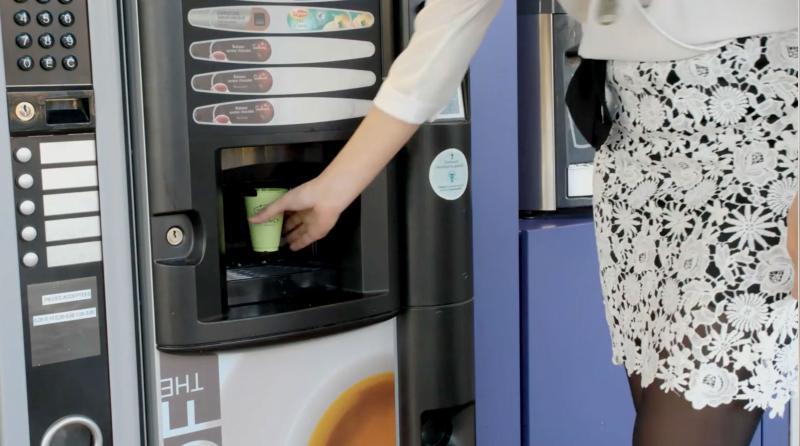Company provides multicoloured reusable cups to companies to reduce waste and create jobs for disabled people
Whether grabbing a cappuccino on the go or taking a break at the office watercooler, people use and discard billions of disposable cups per year. Caroline Bettan and her fellow students saw those cups scattered across their university campus in Rennes and decided to make a business out of it.
It was 2014, and Bettan and three other students were charged with creating a hypothetical start-up as part of their master studies in entrepreneurship and innovation. “At the end it was not a fake project because we started developing this company and decided to keep going after we finished school,” says Bettan, who grew up in Rennes, France.
One of the teammates had worked for an events company that used reusable cups.
The idea was to provide reusable cups to office employees, who would use the same cup during the workday, and then drop it into a dedicated cup collector upon leaving the office. “We come to collect it, wash it, and bring it back,” Bettan explains. For clients, it was an easy way to reduce waste.
After graduating from the Rennes School of Business in 2015, the four set out to perfect the cup and the services around it, founding their company, Newcy, a year later.
Replacing over 39 million disposable cups
One of the first things they did was to assess the product’s life cycle. Bettan says the team wanted to make sure that the cup service would actually reduce waste. “We didn’t want to develop another greenwashing solution,” she says.
The life cycle assessment helped them to choose the material for the cups, polypropylene, a synthetic resin. The cups are produced in France in a range of colours. Though the material is petrol-based, the assessment showed that it had the best sustainability performance. “We chose this material because it allows us to reuse it a long time,” Bettan says. “We need something that’s not fragile, but also that would fit in vending machines.”

Newcy’s cups adapt to any kind of vending machine or drinking fountain, and they can hold hot and cold liquids. Bettan says each one will last at least 12 years and can be easily recycled at end of its life. Newcy developed a proprietary industrial washing process to reduce consumption of water −using only around 7 centilitres per cup − and soap.
Based on the life cycle assessment, the company estimates that so far it has replaced 39 million disposable cups, avoided 567 tonnes of carbon emissions, and saved 3 million litres of water. Newcy also offers training for clients on zero waste management and other sustainability topics.
Newcy won second place in the general category of the European Investment Bank Institute’s Social Innovation Tournament in 2022, which acknowledges entrepreneurs who are making a difference socially, ethically or environmentally.
Creating jobs for disabled people
In addition to its environmental impact, the start-up also works with companies that employ people with disabilities. Every couple of weeks, these employees collect used cups from offices and clean them in Newcy’s washing stations. The service currently employs about 36 disabled workers.
Today, Newcy has around 100 clients in France, including big companies, such as the EDF, Orange, the French train service SNCF and Vinci. Government entities and schools round out their client list.
The company offers a subscription to its services, which helped it survive when offices emptied out during the COVID-19 pandemic. The clients who had signed up before the pandemic stayed on, and Newcy made it through the pandemic without having to reduce staff.
Nonetheless, the company’s reusable cups will never be as cheap as disposable ones. Bettan says their main challenge is to encourage prospective clients to think beyond financial costs to global impact — reducing their carbon footprint while creating jobs.
“People who contact us want to create change, but in a large company you have such a large chain of command, so they have to convince a lot of people,” Bettan says “And every time there is a crisis, people kind of take a step back on the environment. So, you have to keep going, and keep convincing them over and over.”
Those who have been convinced consider Newcy’s solution a worthwhile investment. Céline Obejero, the director of corporate and social responsibility. At Orange Ouest, one of the start-up’s first clients, explains: “To feel engaged in our energy and ecological transition, our staff needs to experience it on a daily basis.”
“With these cups, we are living it every day.”
